-
Genealogy & Names
-
Tourist Information
-
Culture & Reference
1798 Rebellion
Dermot, Strongbow and the Invasion of Ireland
The Titanic and Ireland
The Vikings in Ireland
The Ancient Ogham language
Padraig Pearse
Countess Markievicz
Saint Patrick
Saint Brigid
Robert Emmet
Kevin Barry
Michael Collins
Eamon deValera
Sean Lemass
Daniel O'Connell
Charles Stewart Parnell
Wolfe Tone
Brian Boru
Grace O'Malley
James Connolly
Irish Stamps
CHRISTMAS GIFTS FROM IRELAND - VISIT IrishNation.com Only -2 Days To Go! |
|
Dec 2020 
Snowy Ben Bulben in Sligo Scene from Free Photos Of Ireland |


find out more |

| Popular Articles from Recent Newsletters: |


|
Ireland currently has the worst 7-day average of COVID-19 cases in the entire world. This stark realization has hit the Irish population and Government hard. A much stricter lockdown has been imposed, similar to the first lockdown last March. 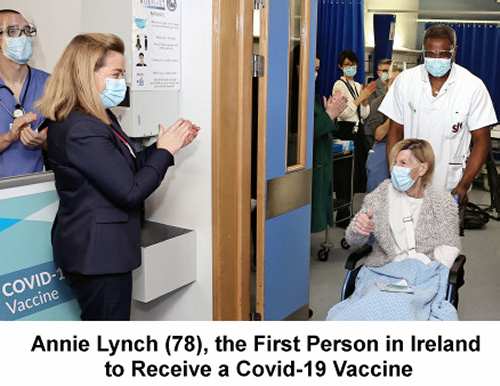 All non-essential business are closed, including restaurants, pubs and most retail shops. Schools have also been closed in what is a bitter blow to the Irish Government that had placed schools as one of their top priorities.
All non-essential business are closed, including restaurants, pubs and most retail shops. Schools have also been closed in what is a bitter blow to the Irish Government that had placed schools as one of their top priorities.
Like so much about COVID19 the factors that led to this situation are many and varied. The Government bowed to public pressure to reduce the restrictions prior to Christmas to allow people to have a limited amount of socializing. It is quite obvious now that the amount of socializing and shopping that occurred was vastly greater than was expected. This may also have combined with the new UK variant of Covid-19 (which seems to be much more contagious). Another undoubted cause of the spread has been the easy access to Ireland via airports. It is bizarre that it is only very recently that the Irish Government is insisting that incoming travellers have a negative Covid-19 test before being admitted to the country. Finally, it is also the case that the cohort of citizens who refuse to adhere to any rules, refuse to wear masks in indoor crowded settings or who continue to organize house parties, birthday parties, new year's eve parties, etc. have had a major impact on the current numbers. Of course just about every country has a cohort like this, not just Ireland. Such has been the consequence of this alignment of factors that the latest wave of infections threatens to overwhelm the already under-funded and under-staffed Irish hospital system. Several private hospitals have been contracted to provide overflow capacity if necessary, in a measure that will severely add to the incredible COVID-19 bill the country is already facing. Of course the great hope across the world now is the roll-out of the various Covid-19 Vaccines. Ireland has started its vaccination program, but it is moving very slowly, bogged down as it is by the often impenetrable layers of bureaucracy and power-hungry fifedoms that have always been rampant among the Irish elitedom and professional classes. 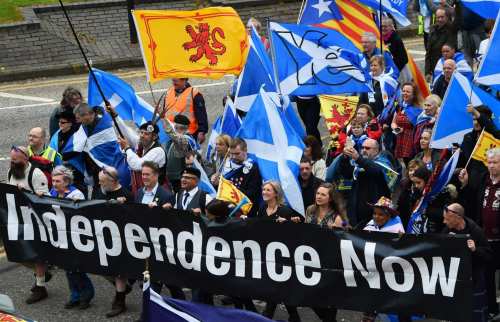 Well, it took years of wrangling and endless negotiations but the UK has finally left the European Union with a last-minute trade deal unsurprisingly being agreed.
Well, it took years of wrangling and endless negotiations but the UK has finally left the European Union with a last-minute trade deal unsurprisingly being agreed.
The consequences of Brexit are sure to be felt for many years to come and already there are problems with paper-work and regulations being implemented. But of course these issues will be ironed out. Problems surrounding business concerns always seem to be. Money 'talks' after all! The shorter-term consequences for the actual United Kingdom however may play out quicker than most people expect. Both Northern Ireland and Scotland voted against leaving the EU in the Brexit referendum. By ripping Scotland out of the EU against their will the London Parliament has effectively played into the hands of Scottish nationalists who expect to have a re-run of the 2014 referendum for Scottish independence that was amazingly defeated by 55% to 45%. Next time around the Scots will surely expect to be able to rejoin the EU if they vote for independence. This may prove to be just too large a carrot to resist, for many of those who were very wary of the financial implications of potential Scottish independence the first time around. And in Ulster the momentum for a vote on Irish reunification may become irresistible. Despite the likely fierce resistance of those Unionists who want nothing whatsoever to do with the Southern part of Ireland, there is certainly a cohort of more moderate Unionists who may be similarly tempted by the rejoining with the EU that a United Ireland would provide. It is an irony that the often bombastic approach taken by the Tory Government regarding British sovereignty and independence from the EU may actually result in the break-up of the United Kingdom itself. There has been a lot of focus on the role of national Postal Services in recent times. 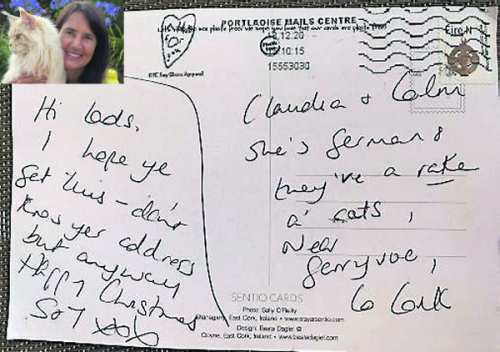
And perhaps in this age of Covid there is a greater appreciation for the way our national and international postal systems actually work. Despite the Pandemic having the effect of greatly reducing the delivery times of parcels and letters (due to staff shortages, lockdowns, reduction in airline flights, etc.), it is good to know that the vast, vast bulk of mailings do actually arrive, eventually. A case in point was illustrated recently in County Cork. Dr. Claudia Maria Wagner is a well-known cat breeder who in 2019 appeared on the Irish TV show 'The Cat Hospital'. To her surprise she received a letter addressed to her as 'the German Lady with a Rake of Cats'. The sender was a chap from Cork who clearly did not know the full address but took a chance anyway. The card travelled from Cork to the An Post Mail Centre at Portlaoise and then back to Cork again. Luckily the local postal staff knew just who the 'Cat Lady' was and got the card delivered. Bravo! |

|
||||

|
Holidays were a crucial part of my young life. In fact I was convinced that everyone should be on holiday all the time. It was far better than the alternative, where everyone was away from home doing something called work. Work I understood early on, was a distasteful business, if it was not, why did everyone complain about it bitterly and worry about it and talk incessantly about such and such a person at work who, to me, appeared to be the cause of all ills. 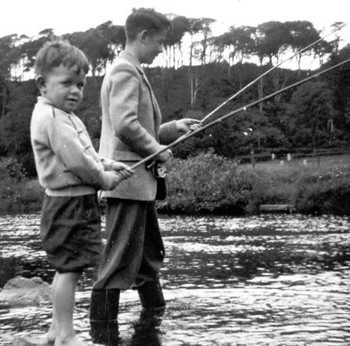
Work kept my father out of the house all day when I would have much preferred to have him home, work seemed an unnecessary affair that interrupted our otherwise pleasant life. All this unpleasantness ended when holidays were declared to be imminent. Evenings were spent discussing far away places where fishing took place and swimming, whatever that was, was much anticipated. It was almost as exciting as Christmas. Christmas was a known event in our lives. Holidays however were a complete unknown. I heard names like Stradbally and Killarney mentioned. Where were these exotic places and how would we get there and where would we live when there, it was all very worrying and exciting. Higher parental powers decided the where's and why-fores of things and I was left to make sure important things like my fishing rod, catapult and Swiss army knife were packed. Any one of those items forgotten would have spelled catastrophe at the least. My fishing rod, I now see from the photo that you can view here, was a bamboo pole with no reel. But it was mine and held the key to untold adventures that lay ahead. On the day holidays started we were up at the crack of dawn ready to pack the car, an old Austin Somerset, that I felt was a brand new and an exceptional motor car. We loaded up for the journey, packed lunch, drinks and vast heaps of luggage and set of on our journey. From my four year old perspective we were heading for an assault on the Himalayas, and would obviously be gone for six months, or perhaps a year. After endless hours, many stops for toilet breaks, we arrived tired and relieved to be at our destination. I immediately wanted to commence fishing, since to me that was the reason for the trip, and according to the books on fishing I'd seen, the only reason to live. Bernard Venables was a famed British fishing writer, whose book 'Mr. Crabtree goes fishing' had been given to me by Santa, and was my bible. It was read to me frequently by my ever patient older sister, Breda. Many, many years later I still have it an enjoy it just as much as I did in those innocent days. I was persuaded that the next morning would be the best chance for fishing and reluctantly went to bed with Mr. Crabtree under my pillow and in my dreams. The next morning I was waiting patiently when the first bleary eyed member of the household stumbled into the kitchen. They're minds may have been set on tea and coffee but mine was fixed on fishing. After endless nagging I was brought to the secret fishing place and clumsily cast my first line. I was immediately surprised not to catch a fish. Mr. Crabtree and his son Peter always caught a fish! I persevered and eventually felt the electric shock of my first strike. I'd memorized every word of Mr. Crabtree's wisdom and knew how to land my wiggly monster trout. The excitement was almost to much to bear. It was even more exciting than the anticipation and was the most thrilling moment of my young life. I needed to share the news and excitement and rushed off to tell my parents and brothers and sister and even strangers I met on the way. What a moment, I'm still excited today, all these years later. The next day I fished again but without much luck, I did begin to understand that the pleasure was as much the fishing as the catching of fish. Next day was Sunday so all was put on hold to put on 'the Sunday best' and make tracks for church. This was apparently more important than fishing. At least the parents thought so! I was not so sure. I dutifully accompanied my well dressed family to the church and shuffled into an open pew with them. Holy ceremonies began, hymns, sermons, communion, etc., went on seemingly for hours. My mother, the religious anchor of the family was disturbed by something throughout the affair and eventually turned to me in an accusatory manner and said 'whats that smell?!' 'What smell I offered' 'a horrible smell' she said, 'smells like it's coming from you.' Innocent that I was I asked 'is it this?' and pulled the two day old trout from the pocket of my Sunday best. Mothers face took on a familiar expression, she straightened her shoulders against another of one of life's challenges, took firm hold of my ear and marched me out of the church. I was proud of that trout, my first catch, I think of it every time I hook a fish and I think of my mother, the dignity she tried to protect, the battles she fought on behalf of her family and the pride she held for all of us. Brian DeVon |


find out more |

|
Of the many stories of revolutionaries that emerged from the early part of the twentieth century in Ireland one of the most remarkable involves the woman who was born Constance Gore-Booth in 1868. 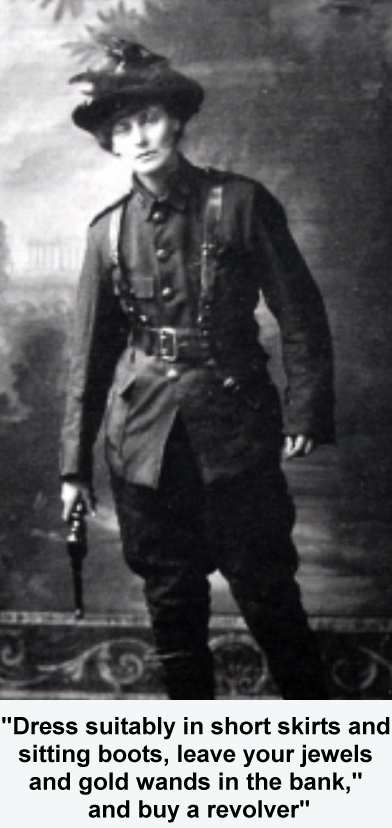 She was born in London to Sir Henry Gore-Booth,
the famous arctic explorer, who was an Anglo-Irish
landlord. Her father was not typical of his type
and administered his lands with a degree of
compassion for the peasantry who farmed it.
She was born in London to Sir Henry Gore-Booth,
the famous arctic explorer, who was an Anglo-Irish
landlord. Her father was not typical of his type
and administered his lands with a degree of
compassion for the peasantry who farmed it.
Such was his mercy that he is reported to have provided famine relief at his estate in Sligo during the famine of 1879. This act undoubtedly inspired humanity and concern for the poor in his daughter. Living in Sligo the family were friends with the family of W.B. Yeats, the romantic Irish poet. He later wrote the poem 'In Memory Of Eva Gore-Booth and Con Markievicz'. The young Constance initially studied painting in London in 1893 where she became involved in the issue of suffrage for women, joining the 'National Union of Women's Suffrage Societies'. She continued her artistic studies in Paris in 1898 where she met Count Markiewicz, who was a Ukrainian aristocrat of Polish origin. They wed in 1901 after which she assumed the title Countess Markievicz. The couple settled in Dublin in 1903 where the Countess co-founded the 'United Artists Club' which was a cultural and artistic organization. It was perhaps inevitable that while circulating in such society she would be exposed to the revolutionary ideas that were being swept along with the Gaelic revival of the time. In 1908 she joined Sinn Fein and Inghinidhe na hEireann - 'The Daughters of Ireland', which was a revolutionary group established by Maud Gonne, with whom she later acted at the fledgling Abbey Theatre. She continued to participate in the Suffragette movement in England and by standing for election she helped to defeat Winston Churchill in a 1908 Manchester by-election. It was in 1909 that she established the radical 'Fianna Eireann' which was aimed at instructing a youth army in the use of firearms. She was jailed by the British authorities in 1913 after speaking at an IRB rally to protest the visit of George V to Dublin. She had also joined the Irish Citizen Army (ICA) established by James Connolly in response to the 1913 'lockout' of workers. She established soup kitchens and aid for the Dublin poor, often using her own funds. Her marriage had by now disintegrated with her husband returning to Europe in 1913. The Countess became a Lieutenant in the ICA and participated in the Easter Rising of 1916 where she was second-in-command at the fight on St. Stephens Green. Initially the rebels dug trenches in the green but soon retreated from this position once they were became vulnerable to snipers positioned on the high buildings around the enclosed green. Under the command of fellow ICA member Michael Mallin they occupied the Royal College of Surgeons, rebelling for a total of 6 days. They surrendered only when they received a copy of Padraig Pearse's surrender order. 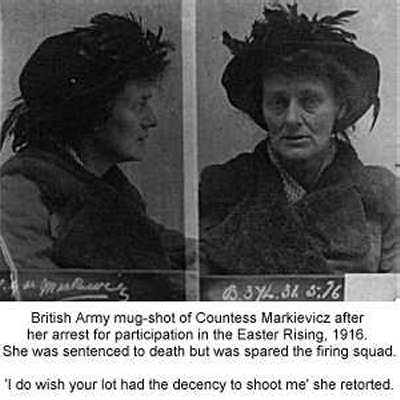 The Countess was jailed in
Kilmainham and sentenced to death but her sentence
was commuted on grounds of her gender. 'I do wish
your lot had the decency to shoot me' she retorted.
She was released from prison in 1917 by which time
the tide of support had turned in favour of the
rebels and the path to independence was set.
The Countess was jailed in
Kilmainham and sentenced to death but her sentence
was commuted on grounds of her gender. 'I do wish
your lot had the decency to shoot me' she retorted.
She was released from prison in 1917 by which time
the tide of support had turned in favour of the
rebels and the path to independence was set.
In 1918 she was again jailed for her anti-conscription campaigning but upon release was elected to the English parliament, refusing to take her seat. She was the first woman to be elected to the House of Commons. She was a member of the first 'Dail' (Irish Parliament) in 1919 and became the first Irish (and indeed European) Cabinet Minister, serving as Minister for Labour from 1919 to 1922. Countess Markievicz joined deValera in opposition to the Anglo-Irish Treaty of 1922 which partitioned the country and fought in Dublin in the ensuing civil war. She was again imprisoned but this time by her former comrades-in-arms. Upon her release she became a founder member of Fianna Fail and was elected to the fifth Dail in 1927. deValera had by this time changed tactics and intended to participate in the parliament. The Countess however, never got her chance when, at the age of 59, she died of tuberculosis (or possibly appendicitis) in July of 1927. She likely caught the disease while working in the Dublin slums. Her husband and family were by her side. The famous Rebel Countess was buried in Glasnevin Cemetery with a huge farewell crowd of 300,000 in attendance at the north Dublin graveyard, the final resting place of so many of Ireland's great patriots. |

|
part 1 of this story can be found here I introduced myself to three young men, eyeing me warily. Joe, from San Francisco, California, was a recent college graduate whose grandmother had given him a trip to Europe. He offered that he was having so much travel fun that he had extended his time on the continent by staying at the cheaper hostels versus hotels, B & B's and guesthouses he had enjoyed earlier. Jose, a Spaniard, with limited command of English and I, with my 'yo hablo Espanol poco y poco' (I speak a little Spanish), chatted, gestured and laughed our way to a form of mutual understanding. 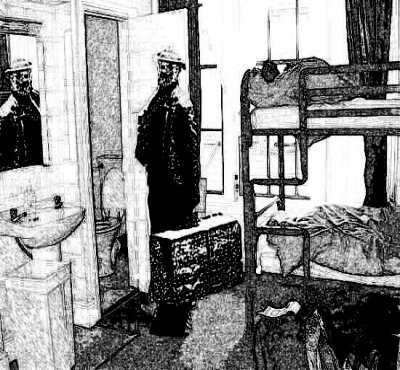
He had been working in Dublin several months in menial jobs far below what his Spanish university degree had prepared him for, wanting like many other young European men and women I would subsequently meet, to enjoy some of the fruits of the then booming Irish ('Celtic Tiger') economy. All this time he and friends had been staying in hostels while trying to find a scarce apartment groups of five and six could afford. The last of the trio was Peter. A happy-go-lucky young Aussie, he was on an around-the-world adventure; moving from hither to yon as the mood struck him and scrounging some kind of work at each stop to finance his continuing odyssey. Their acceptance eased some of my concerns. When I asked what bunk was available (all appeared to be taken), Joe nodded toward the top bunk of the double against the short wall by the room's door. I excused myself, created a narrow opening within the wall of plastic bags and boxes, stowed my large suitcase end up (on its bottom it would have interfered with opening/closing the door), topped by the carry-on satchel and bedding. After a delicious lunch of thick vegetable soup, brown bread and a pint of my favorite drink Guinness Stout at Gallagher's Pub several blocks away at the corner of Mountjoy and Dominic Streets, I headed for city centre anxious to see my daily walking commute. Dodging the crush of crowds, I made my way on Kildare Street, across from Trinity College, to my objective, The National Library. In the gray stone building, I familiarized myself with the genealogy section, determined the next day to begin finding details about my Irish ancestors. Late afternoon, roughed by a keen wind, I wandered back over the Liffey River, past Bachelor's Walk and up O'Connell Street. On this busy thoroughfare, I took touristy pauses here and there; then, lingered for a time before the huge weathered statues of Daniel O'Connell and Charles Stewart Parnell. The romantic in me wondered if I might discover an ancestor or two of comparable stature to these legendary Irish patriots. Would Father John Murphy, of County Wexford, one of the heroes of the 1789 Rebellion be an ancestor? The limited information from my cousin indicated I had a great-great, or was it a great-great-great grandfather, James Murphy also from County Wexford. Or, would I find that in that part of the family tree a fair share of rogues, scoundrels and otherwise sinister ghosts lurked? Along the way, I passed few family eateries and less priced to my budget. So early evening, stomach rumbling – my usual lunches at home were more substantial to fortify me for the often laborious odd jobs I was doing – I hastened in the opposite direction for dinner. Five minutes from the hostel, across from Mater Misericordiae Hospital, I passed a tiny store-front take-away. The Tasei Citchen (in Ireland the letter 'C' is pronounced like 'K' in kitchen) had seating for maybe 15 people. Spotting nothing immediately ahead, I returned and stationed myself on a bar stool at a high counter against the front window so I could observe the flow of passersby on the street. During a dinner of lasagne, two vegetables, tossed salad tea and a warmed scone for dessert (all for U.S. $5.75), I shared my street scenes viewing with snatches of conversation with Brenda. The cheery, middle-aged waitress, mother of three grown daughters, who described herself as a transplanted Cockney from London, said I'd be saying 'tay' (for tea) like a native in no time. I found myself telling this sweet woman about my wife of 38 years, Betty. 'Betty doesn't like the cold, wet climate and she'd never stay away from home for more than three weeks. I miss her already but had to make this trip before I'm of an age when I would have to be helped off a tour bus to get around.' Brenda laughed. Leaving me to attend to other customers, she said, 'Richie, you be good now. Don' forget to call Betty tonight.' Later, from a street corner phone booth, phone card with instructions before me, Betty sounded like she was standing right next to me. After an all too brief conversation, I walked back to the hostel missing her, doing some quick calculations in my head about my meal budget and, weary from jet lag, looking forward to a good night's sleep. In the dorm room, everyone was gone but for my Spaniard friend, Jose, his friend, Pablo, in a nearby bunk and the fellow in the lower bunk of my rack, a laconic Italian named Vincenzo. After introductions, they shucked their heavy comforters, arose and dressed. I heard mention of dinner. It was 9:00 p.m. For the past 38 years, I hadn't been used to anyone but my wife in the bedroom. Alone for the moment, I thought, this is great. I'll get some good sleep and start my family research tomorrow really refreshed. But for me the room was suffocatingly hot. I groaned aloud. Here I am in the cold climate I love – quite happy to he away from the beginning of hot weathered where I lived – and now having to endure heat in the worse place for me, where I sleep. Starting to sweat, I opened the window at the other end of the room as wide as possible, figuring the brisk March wind would blow cold night air into the room. Then, to be sure I'd have the desired coolness, I decided to turn off the radiator below it. Try as I may the on/off knob wouldn't budge. Hoping for the best I went across the unheated hall to the nearest men's bathroom. In the stall closest to one of two open windows, I breathed deeply of the chilled night air. Oh, yeah, it was just right. Now if the room will only … Back in the oven-like room – rising heat waves from the radiator seemed to wall out the slightest breezes from outside – I decided to shower. I rooted through my crammed suitcase and finally found the washcloth but no towel. With months of trip planning, how could I have forgotten something as basic as a towel? Grabbing an old short-sleeve sweat shirt, clean underwear and toiletries, I walked across the hall looking forward to my usual shower routine – start with a hot blast, soap down, rinse with warm and relax several minutes with an icy, pores-freezing finale. Luckily, the shower stall nearest the open window was available. I started to undress when I noticed there were no shelves or hooks on which to place belongings. So, chaffing a bit from not having my usual home conveniences, I piled my worn clothes on the window sill, sneakers (to double as slippers) next to my clean shorts and the sweat shirt as towel on top. Not as convenient as home but all part of the adventure, I assured myself. I looked at the shower fixture. Nothing to control temperature. I pushed the only button. A stream of hot water shocked me. Doing a quick step dance, I got wet; then, stepped away from the water to soap down. Suddenly, the water stopped. Standing there, soap-lathered I briefly wondered if I had used my ration of water and hadn't been told about this at the check in briefing.... 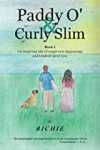
~~~ (the final part 3 next month!) Richie Patton is the author of the 'Paddy O' & Curly Slim' Saga that you can view at his Amazon Page |

View the Archive of Irish Phrases here: http://www.ireland-information.com/irishphrases.htm |

|
The winner was: fran_mcgoo@msn.com who will receive the following: A Single Family Crest Print (usually US$24.99) Send us an email to claim your print, and well done! Remember that all subscribers to this newsletter are automatically entered into the competition every time. I hope that you have enjoyed this issue! 
by Michael Green, Editor, The Information about Ireland Site. https://www.ireland-information.com Contact us (C) Copyright - The Information about Ireland Site, 2019. 17 Páirc Ghrainbhil, Carraig Dubh, Contae Baile átha Cliath, Ireland Tel: 353 1 2893860 |

|
MARVELOUS GIFTS FOR ANY OCCASION FREE DELIVERY TO YOUR DOOR 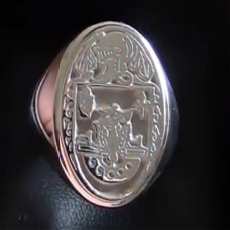
BIG REDUCTIONS! Stunning Family Crest Signet and Seal Rings 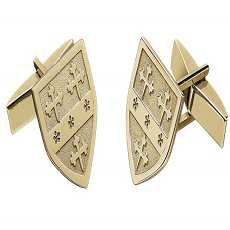
DISCOUNTED FOR A LIMITED TIME Elegant Cufflinks 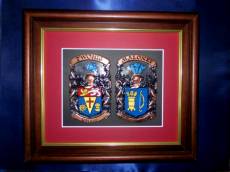
Incredible Family Crest Plaques Made in Ireland 
Superior Framed Family Crest Parchments 
Gorgeous Glistening Galway Crystal 'Your-Name' Old Irish Sign NEW DESIGNS! 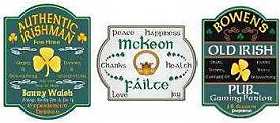
From US$34.99 - Free Delivery 
New Designs available on our Coffee Mugs 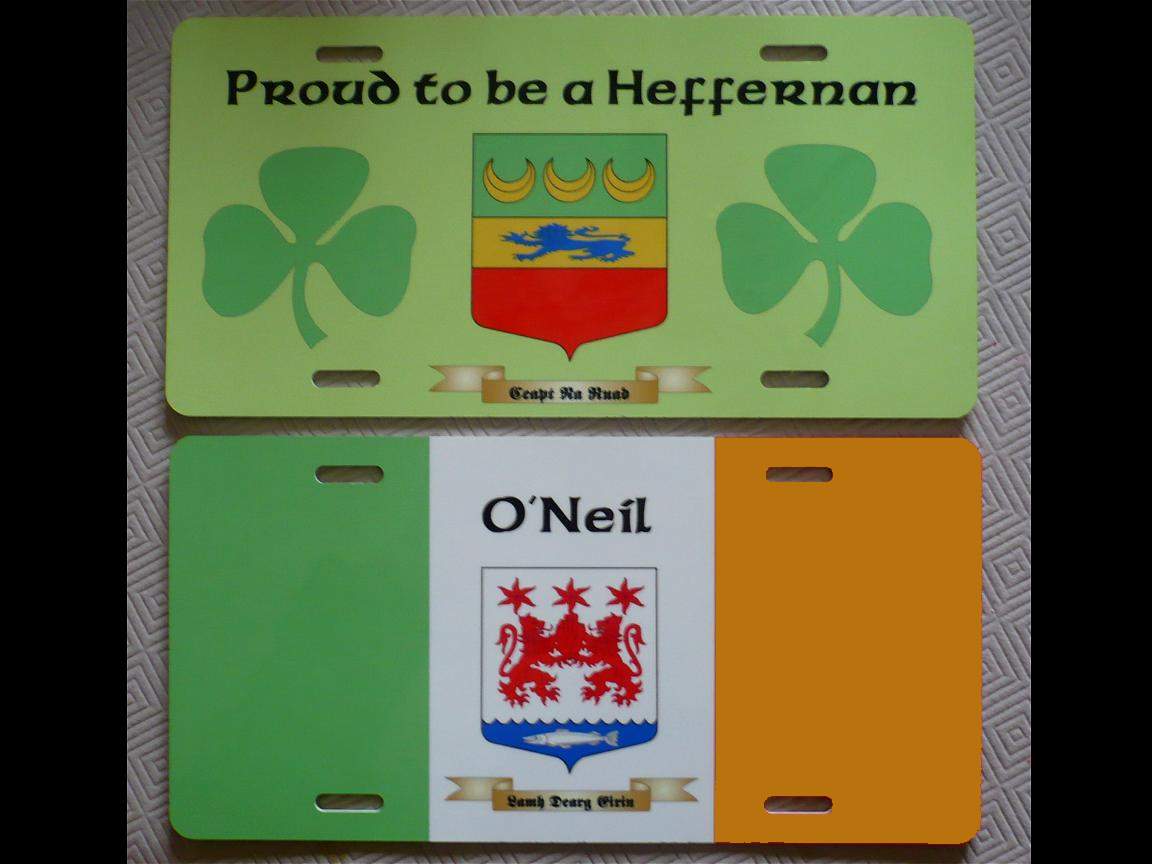
Personalized Licence Plate 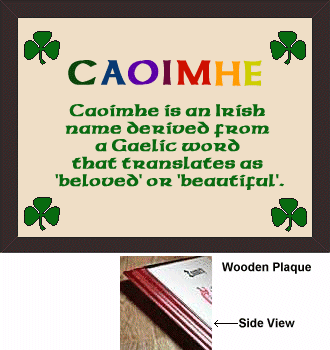
Personalized First Name Plaque. Great for Kids! 
'Your-Name' Polo & Tee Shirts 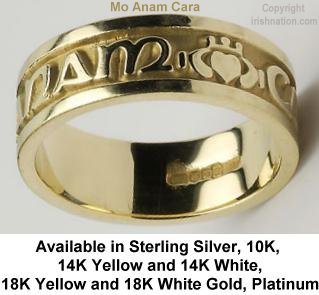
From US$69 Delivered BIG REDUCTIONS! Stunning Engraved Rings from Ireland with Irish Language Phrases. Mo Anam Cara: My Soul Mate Gra Dilseacht Cairdeas: Love, Loyalty, Friendship Gra Go Deo: Love Forever Gra Geal Mo Chroi: Bright Love of my Heart SEE MORE GREAT OFFERS AND DISCOUNTS AT: IRISHNATION.COM FREE DELIVERY FOR A LIMITED TIME! |


